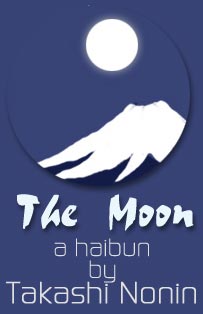
-
"The autumn moon is incomparably beautiful. Any man who
supposes the moon is always the same, regardless of the season,
and is therefore unable to detect the difference in autumn, must
be exceedingly insensitive."
--The Tsurezuregusa, by Kenko (AD 1331);
Translated by Donald Keene.
How true! We have only to say "the moon" when we refer to the autumn
moon. We must therefore put such epithets as "spring/vernal", "summer",
or "winter" before the moon when we mention the other season's moon.
The autumn moon makes the difference. My old SAIJIKI has 126 words
or phrases with regard to the autumn moon. Which shows how profoundly
the Japanese have affiliated with the moon since ancient times.
Today, October 5th (September 15th according to the lunar calendar)
is the Full Moon. Tonight TV stations across the Archipelago telecast
the full moon with a few seasonal comments. "A poet can not but
be jocund." We look up and admire the moon tonight.
When it happens to be cloudy and we cannot see the moon, we don't
complain but try to see the "invisible" moon way beyond the clouds.
This is Mugetsu or No Moon. When it's raining, we call the Rainy
Moon Ugetsu. We miss the moon, to which our thoughts go out through
the rain.We praise the moon and enjoy everything about the way the
moon lookstonight. Eared pampas grass and several other flowering
plants fresh from the autumn fields arranged in a vase, together with
"moon-viewing dumplings"(Tsukimi-dango) are placed near the open
window as the gifts for the moon.
Our hearts are filled with anticipation on the Eve of the Full Moon (Oct.
4th this year). This is Matsuyoi or The Moon-awaiting Evening.
the Moon-awaiting Evening
the mistress of a (Japanese-style) tavern
having a woman visitor
--Buson (1)
When the sky is cleared of clouds on the Full Moon night, we call it
Ryoh-ya, or Wonderful Night. This is the Great Full Moon, or
Meigetsu, as well. With the help of crisp, clean air, the moon
gets so crystal-clear as to show us the Sea of Tranquility on
its surface.
each and every person
absorbed in reading
the Moonlit Night.
--Yamaguchi Seison
the moon at the sky's zenith -
I walk past
a poor quarter.
--Buson
the Full Moon
promenading the pond
the whole night through.
-- Basho
"Catch it for me!"
the child cries for the Full Moon
-- Issa
The moonrise gets tardier hour by hour after the Full Moon.
But we continue to cast the tender eye upon the waning
moon until it's completely hidden in the Evening Darkness or
Yoiyami.
(According to this year's, 2005, solar calendar, see below)
9/17 -- the Moon on the evening of the 16th or Izayoi.
the Moon on the night of the 16th -
whales showed up for the first time
Kumano Bay.
-- Buson
9/18 -- the Moon whose rise one can await STANDING, or Tachimachizuki
9/19 -- the Moon whose rise one can await SITTING or Imachizuki.
9/20 -- the Moon whose rise one can await LYING ON THE BACK, or
Fushimachizuki /Nemachizuki.
9/21 -- the Moon whose rise one has to await TILL LATE AT NIGHT, or
Fukemachizuki.
And a lunar month (28 days) passes and it gets colder...
10/13 -- the Moon on the Evening of the 13th or Juusan-ya (13th night),
or Nochi-no-tsuki
determined to stay overnight
I came all alone -
the Moon on the 13th Night.
--Buson
buckwheat flowers
hidden in the mountains -
the Moon on the 13th Night
--Issa
Let us watch the moon rise tonight--the earth's sole satellite that we
share!
What's the weather like in your district? Insofar as Matsuyama is
concerned, it IS a beautiful morning today.
Happy haikuing, hoping you won't be lunatic or moonstruck!
e-mail: Takashi Nonin
The translations of the haiku in the text above are by Takashi Nonin,
he added this note, not included in the original.
(1)Note: In my understanding, Buson himself must have
wanted to drop into his favourite tavern owned by a
lovely woman he was attracted to. I so translated it.
According to Blyth, Buson apparently recalled the passage
from Heike Monogatari telling of Tadanori's tryst with a
princess's daughter who happened to have a woman visitor.
He eventually failed in his romantic approaches.The two
women never mentioned this incident. Only the insects
were chirping loudly outside.
Blyth's translation:
The moon-awaiting evening;
The woman who lived mistress of the house
Had a woman visitor.
Our haiku images could change from reader to reader.
What's yours?
*****
The 2014 Full Harvest Moon will fall on September 8, 9:39 p.m. EDT — Traditionally,
this designation is used for the Full Moon closest to the Autumn Equinox. Two years out
of three, the Harvest Moon falls in September, but every third year it occurs
in October. The full Moon normally rises an average of 50 minutes later each
night, but for the few nights around the Harvest Moon, the Moon seems to rise
at nearly the same time each night: just 25 to 30 minutes later across the
U.S., and only 10 to 20 minutes later for much of Canada and Europe.
lunar phases |
 Touch the moon
to return to
The Haiku Poets Hut
Touch the moon
to return to
The Haiku Poets Hut